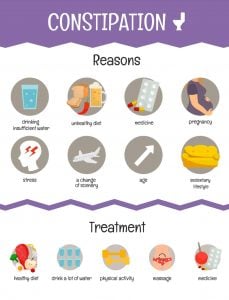
Constipation is a condition in which a person has three or fewer bowel movements in a week and a feeling that not all stool has passed. The stool can be hard and dry. It is a disorder characterized by irregular and infrequent or difficult evacuation of the bowels.
Sometimes it is painful to pass the stool. Almost everyone gets constipated. In most cases, it is not serious if lasts for a short time. However, medical treatment is needed in severe cases as it may also lead to death if left uncured.
How bad is my constipation?
Mild: Occasional or intermittent bowel movement. Constipation symptoms, as mentioned below, occur occasionally or intermittently. The symptoms can be managed at home through lifestyle and dietary changes. You need not contact your Doctor, who generally advises the occasional use of stool softeners. You may also use laxatives to increase bowel movements and loosen the stools.
Moderate: if the below-mentioned symptoms persist even after regular use of laxatives or enemas, you need to contact your doctor. The symptoms generally include fewer than three bowel movements a week and hard, dry or lumpy stool. It may limit your instrumental activities of daily life (medication management, housekeeping activities, and ability to manage finances). Contact the medical professional to ascertain the cause and formulate a suitable treatment plan for you. You may need to go for manual evacuation of stools out of the body.
Keep track of your symptoms using Ankr (myAnkr web portal or the Ankr app). It will help you describe the uneasiness to your Doctor or nurse.
Severe: Obstipation (severe constipation that makes defecation impossible or nearly impossible). Any of the symptoms listed below warrant immediate medical attention. It may limit your self-care activities of daily life (eating, dressing, getting into or out of a bed or chair, taking a bath or shower, and using the toilet). You must contact your Doctor as soon as possible.
Life-threatening– This is a medical emergency and needs consistent care and support. You may call 911 or contact your Doctor as per the best suitable option for your situation.
Warning signs/severe symptoms of constipation that need immediate medical attention
- Bleeding from rectum
- Blood in stool
- Constant abdominal pain
- Inability to pass gas
- Vomiting
- Fever
- Lower back pain
- Abnormal weight loss
How to manage symptoms after constipation?
- Eat more fruits, vegetables and grains, which are high in fiber
- Drink plenty of water and other liquids
- Get enough exercise
- Take time to have a bowel movement
- Use laxatives if recommended by physician
- Ask your doctor if any medicines you take may cause constipation
What caused my constipation?
- Inadequate consumption of food with fiber
- Not drinking enough water or other fluids
- Lack of physical activity
- Cancer treatments
- Scar tissue from surgery or cancer growing in the bowel, which can narrow or partially block the bowel
- Cancer pressing on the spinal cord
- High levels of calcium in the blood
- Low potassium levels
- Thyroid gland problems
- Diabetes
How can Ankr help with your constipation?
Don’t try to treat a clot by yourself. Use Ankr to:
(1) learn about the common symptoms of constipation
(2) send message to your Doctor if they use Ankr platform*
(3) be better informed about how to prevent another constipation
